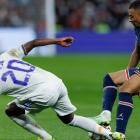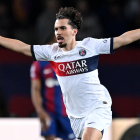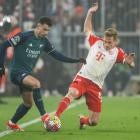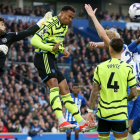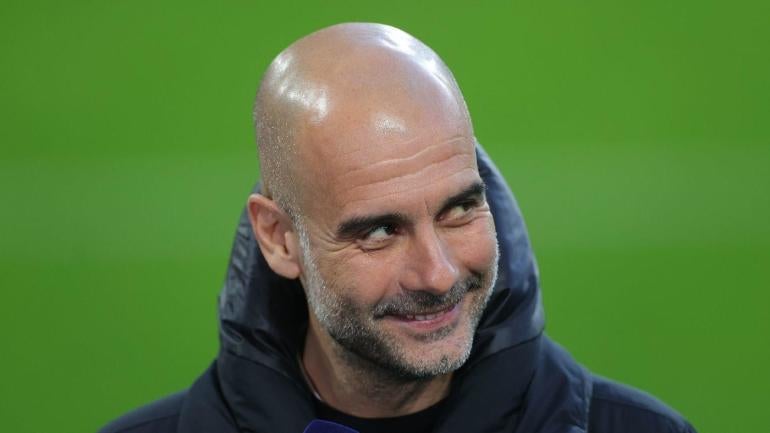
Pep Guardiola undeniably ranks among the great footballing minds of his generation. The man gives off the impression that he spends his every waking hour thinking over to how he will win his next match.
In Marti Perarnau's book, Pep Confidential, which tells the tale of his first season in charge of Bayern Munich, he describes Guardiola staying up into the early hours of the morning plotting how he will overturn a 1-0 first leg deficit to Real Madrid in the second leg of the 2014 Champions League semifinals. The words of chess grandmaster Garry Kasparov are said to echo around his brain as he tries to build a plan to deliver victory for the Bundesliga giants. His decision to take Phillip Lahm out of midfield backfired spectacularly in a 4-0 defeat where Bayern have no control of the engine room.
Such tactical complexity has been the arc of Guardiola in the Champions League since leaving Barcelona. At times understandable selection decisions get pigeon-holed into that narrative but equally there have been occasions where the 50-year-old has bamboozled every observer and perhaps even a few players: his man-to-man marking of Lionel Messi and company in the 2014 semifinals, playing Ilkay Gundogan wide right and Kevin De Bruyne deep in midfield in a 3-0 loss to Liverpool, the dreaded back three against Lyon in last season's quarterfinals.
There was a moment last week where you thought Guardiola and City were going to fall into the same trap again. Though his lineup was something approximating the best XI available they went about their task in a curious way, seemingly so fearful of the damage that Neymar and Kylian Mbappe could do that they only defended those two, dropping deep to rob them of room to counter into, and instead opened up acres of space for the rest of the Paris Saint-Germain side. The Citizens rallied in the second half to win the away leg 2-1 and put themselves in the driving seat in this tie heading into its second leg on Tuesday on Paramount+.
Their superiority is such that merely playing to their level ought to be enough to send Guardiola back to the Champions League final for the first time in a decade. They couldn't overcomplicate this, could they? They are, after all, -700 to advance to the final according to William Hill sportsbook. The odds are quite in their favor. However, if they were to mess it up, here's how they might.
1. The back three returns
If you're living in fear of what the Mbappe-Neymar duo -- assuming the former is available -- can do to you why not give yourself something of an insurance policy? Instead of having to worry about PSG's star forwards running at Ruben Dias and John Stones bring in Aymeric Laporte or Nathan Ake and give yourself someone who can sweep in behind should there be any mistakes in the defensive line.
An extra defender equally negates what has been PSG's great weapon in their outstanding run through the knockout rounds so far: their explosive counterattacks which can see them turn possession recovery into a goal in a matter of moments. One extra center-back who can drop off allows City to prepare for the worst, that Mbappe might be able to poke the ball behind his first man and find open space to sprint into. Whilst no-one can quite match the French striker in a straight line, the likes of Ake, Dias and Kyle Walker would at least not be embarrassed in a footrace.
Get into the weeds of statistical fine margins and it becomes somewhat more tempting to defend in numbers. Since the arrival of Neymar and Mbappe in 2017 PSG average 2.7 goals per game in Ligue 1 and the Champions League against opponents who start the game with a four, against a back five or three it is 2.5 goals per game. These are marginal gains for a defending side but those are often what decides the biggest European games.
Of course that is only the case if City know exactly what they're doing in this new system. It is hard to see how they could. Since the start of the season they have used a three man defense on just three occasions in league and European games. None were against the caliber of opposition that PSG represent. Guardiola knows from grim experience what can happen if he rips up his usual plan. The three man defense that lost to Lyon in last season's one-off quarterfinal made basic errors in their offside line and their distribution precisely because they had no experience of playing that way together. Contrast that with how effective Stones has looked with consistent reps alongside Dias and there is no argument for rejigging a defense that is the competition's most effective.
Craving even more coverage of the world's game? Listen below and follow ¡Qué Golazo! A Daily CBS Soccer Podcast where we take you beyond the pitch and around the globe for commentary, previews, recaps and more.
2. All-out pressure
It was the press that swung the first leg so decisively in City's favor. After a curiously passive start to the game the visitors rocketed into life in the second half, trapping PSG in their own half and cutting out the supply line to Neymar and Mbappe at the source.
In the space of 45 minutes plus a little bit of the first half City morphed from what Guardiola described as "shy" to a team capable of delivering their most aggressive pressing performance in Europe this season. According to fbref the visiting team made 194 pressures in the Parc des Princes, 31 percent more than the most they had previously attempted in a 2020-21 Champions League game. A full 83 of those came in the attacking third, again far more than they had attempted in previous versions of this competition.
There was a ferocity to City in the second half that seemed to shake PSG. Though they are used to pressure, it tends not to be as successful or as high up the pitch; though only Nice have faced more total pressures in Ligue 1 this season, Mauricio Pochettino's side rank 10th for pressures in their own third of the pitch.
PSG could not cope and there must be a temptation to simply build on what won them the first leg. The questions are, is there a greater level of intensity that Guardiola's players could reach and would it backfire or be overcome by the Ligue 1 side? The latter might just be debatable, though many of City's most important players were rested for Saturday's 2-0 win over Crystal Palace. As to whether Pochettino can find a way to beat the pressure that his side could not cope with in leg one, there do at least seem some quick fixes available to him.
Deploying Marco Verratti in more of a wide left role was valuable in shutting down Joao Cancelo in the first leg but with Leandro Paredes and Idrissa Gueye, who will miss Tuesday's game through suspension, in the center there was little ball-playing ability in the middle of the pitch, nor players with the technical quality to break through the press. Verratti would offer more of that and with Pochettino's side needing to score twice to win getting the Italian into positions where he can influence play would make them a much more press-resistant outfit.
3. Playing a center forward
How curious that the City of this season have advanced to the stage where it seems like playing a center forward constitutes something of a risk. Certainly Gabriel Jesus or Sergio Aguero, playing his last European game for the club at the Etihad Stadium, bring qualities that others in the side from the first leg do not. But their inclusion would now feel like a compromise to a system that is working exceptionally well.
The Champions League in particular this year has seen Guardiola graduate towards something altogether more fluid without a natural center forward. Deploying Kevin De Bruyne as the playmaking central attacker, not quite a false nine in that he does not start as a striker and drop deep but rather marauds across the pitch, particularly to the flanks where he can dovetail with the full-backs and wingers.
That opens up space either for Phil Foden to drift infield or for late runs from Ilkay Gundogan, no longer in quite the scoring form he hit at the turn of the year but far more confident in his darts into the penalty area. Bernardo Silva can operate as anything from a third midfielder to a second striker, in the first leg it was the Portuguese international rather than De Bruyne who combined with Mahrez on the right flank. The spaces these theoretical central midfielders have vacated can then be occupied by Cancelo, who drifts infield to offer a shield alongside Rodri.
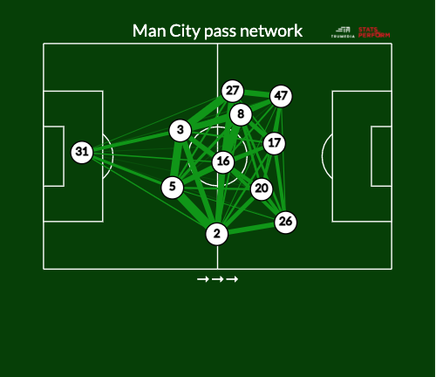
It is then, to put it mildly, a complex web of interlocking parts. It is not that a striker cannot fit in that, especially one like Jesus who is more than happy to drift into wide areas and is considered by his manager to be the best pressing center forward in the world. In the Brazilian's case it is simply that he is not among the four best players in advanced positions at the club. For all the brilliant moments that Sergio Aguero has delivered in his time in England's north west the same could also be said for this version of the striker, so racked by injuries.
Both can be valuable weapons for City, however. In Aguero's case in particular it would be a cause for no little celebration among supporters if he was to get one last European night on home turf and perhaps even a swansong in Istanbul later this month.
Guardiola's Plan A is so meticulous, so hard for opponents to defend against and so devastating when it clicks that there is simply no need to drastically alter things. That hasn't stopped him in the past, however. It may be that PSG's best hope is that Guardiola deviates from a plan that needs no fine tuning, and that whatever new wrinkle he folds into his tactics backfires spectacularly. We've seen it before after all.
CBS Research and TruMedia assisted with this article













